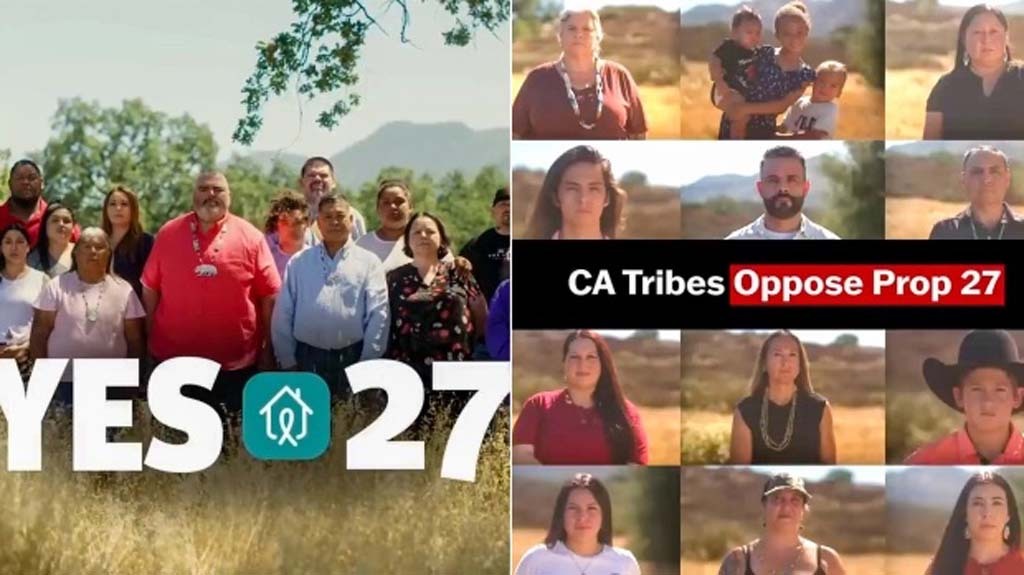Posted by - News Staff![]() -
-
on - October 1, 2022 -
Filed in - Politics -
2.3K Views - 0 Comments - 0 Likes - 0 Reviews

DLNews Politics:
Proposition 27 would authorize to allow Online and Mobile Sports Wagering Outside Tribal Lands. Initiative Constitutional Amendment and Statute.
State law currently bans sports betting in California. However, state law allows some gambling, such as tribal gambling, the state lottery, cardrooms, and horse racing betting.
Native American tribes have certain rights under federal law to govern themselves, such as certain rights to offer to gamble. This means that the state generally cannot regulate tribal gambling except as allowed by (1) federal law and (2) federally approved agreements between a tribe and state (known as tribal-state compacts). When a tribe wants to offer gambling on its lands, federal law requires that the state negotiate a compact with the tribe. The federal government may issue a compact if the tribe and the state cannot agree. In California, compacts allow tribal casinos to offer slot machines and other games on tribal lands. These compacts lay out how gambling will be regulated. They also require certain payments to the state and local governments. Tribes can ask for these compacts to be changed, such as when new types of gambling become legal in the state.
California currently has compacts with 79 tribes. Tribes currently operate 66 casinos in 28 counties. Last year, tribes paid around $65 million to support state regulatory and gambling addiction program costs. Tribes also spend millions of dollars on local governments annually (annually). Additionally, tribes operating larger casinos pay nearly $150 million each year to tribes that either does not operate casinos or have less than 350 slot machines.
Prop. 27 would allow licensed tribes and gaming companies to offer mobile and online sports betting for adults 21 and older outside Native American tribal lands. However, gaming companies — such as FanDuel and DraftKings — could only provide sports betting if they made a deal with a tribe.
Proposition 27 is supported by the state's gaming industry and has more than $170 million in donations. But the proponents of the measure also have some opponents, including the state's Democratic Party, card clubs, and Native American tribes. They worry that the proposal will encourage problem gambling and put tribal economies at a disadvantage against national brands.
It would provide tax revenue for homelessness programs.
In the mid-term election in California in 2022, Proposition 27 claims it would provide tax revenue to programs that help the homeless. After covering the state's new regulatory costs, most money would be used to address homelessness and gambling addiction programs. At the same time, 15% would go to Native American tribes that aren't involved in sports betting.
Currently State Homeless Housing, Assistance, and Prevention Program (HHAPP). HHAPP provides funding to local entities (such as cities) and tribes to help them achieve their goals related to addressing homelessness. Currently, 80 percent of HHAPP funds go to local entities, generally based on their share of the state’s homeless population, 2 percent to tribes, and 18 percent to the state to provide bonuses to local entities and tribes who meet their goals. The program received $1 billion in state funds this year.
The initiative is supported by Democratic mayors in major cities and by homeless advocacy groups. Its backers call it the California Solutions to Homelessness and Mental Health Support Act. Both sides are spending a significant amount of money on the campaigns. Proponents have spent $107 million on advertising, while opponents have raised more than $198 million.
California voters are facing a critical decision this November. The state's midterm election will focus on a bonus round of direct democracy. Voters are considering seven ballot measures. While signature-gathering is notoriously tricky in California, many proposals failed to secure the necessary signatures. As a result, the Legislature cut deals to avoid potentially costly ballot measures.

Desert Local News is an invitation-only, members-based publication built on fact-checked, non-biased journalism.
All articles are publicly visible and free to read, but participation is reserved for members—comments and discussion require an invitation to join.
We cover local, state, and world news with clarity and context, free from political agendas, outrage, or misinformation.